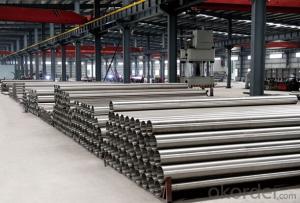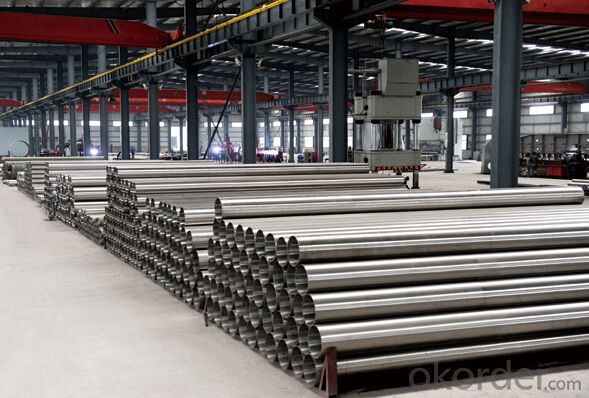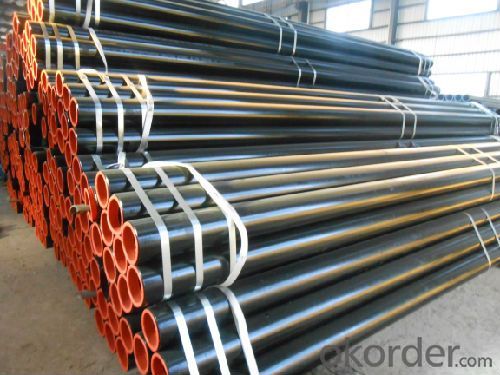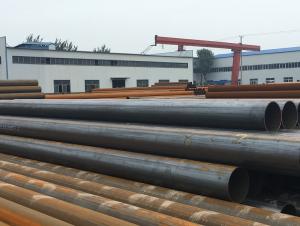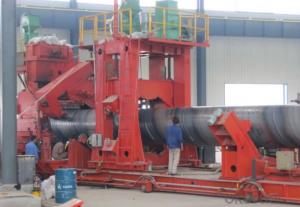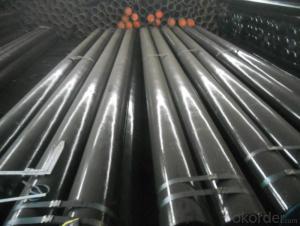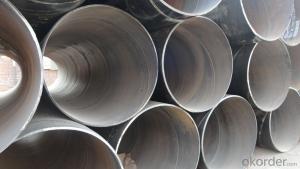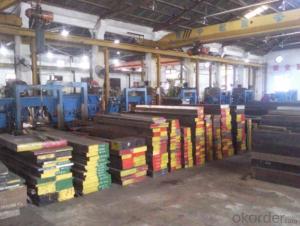Hot Rolled Steel Pipe Manufacturer
- Loading Port:
- China Main Port
- Payment Terms:
- TT or LC
- Min Order Qty:
- 30 m.t.
- Supply Capability:
- 12000 m.t./month
OKorder Service Pledge
OKorder Financial Service
You Might Also Like
1、Full series of products provides an easier access for one stop purchase
▲ Line pipe
▲ Tubing and casing
▲ L & M & H boiler tube
▲ Gas cylinder tube & pipe
▲ Mechanical & Structural pipe
▲ Ship-building tube & pipe
▲ Automobile tube & pipe
2、Main Features of the Seamless Pipe ASTM A106/53:
• High manufacturing accuracy
• High strength
• Small inertia resistance
• Strong heat dissipation ability
• Good visual effect
• Reasonable price
3、Seamless Pipe ASTM A106/53 Specification:
Standard | GB, DIN, ASTM ASTM A106-2006, ASTM A53-2007 |
Grade | 10#-45#, 16Mn 10#, 20#, 45#, 16Mn |
Thickness | 8 - 33 mm |
Section Shape | Round |
Outer Diameter | 133 - 219 mm |
Place of Origin | Shandong, China (Mainland) |
Secondary Or Not | Non-secondary |
Application | Hydraulic Pipe |
Technique | Cold Drawn |
Certification | API |
Surface Treatment | factory state or painted black |
Special Pipe | API Pipe |
Alloy Or Not | Non-alloy |
Length | 5-12M |
Outer Diameter | 21.3-610mm |
Grade | 20#, 45#, Q345, API J55, API K55, API L80, API N80, API P110, A53B |
Standard | ASME, ASTM |
4、Packaging & Delivery
Packaging Details: | seaworthy package,bundles wrapped with strong steel strip |
Delivery Detail: | 15-30days after received 30%TT |
5、FAQ of Seamless Pipe ASTM A106/53:
Why should you chose us?
● Full series of products provides an easier access for one stop purchase
▲ Electric Resistance Welded (ERW) Steel Pipe
▲ Longitudinal Submerged Arc Welded (LSAW) Steel Pipe
▲ Spiral Submerged Arc Welded (SSAW) Steel Pipe
▲ Hollow Section (Square and Rectangle Pipe)
▲ Hot Dipped Galvanized Steel Pipe
6、Seamless Pipe ASTM A106/53 Images:
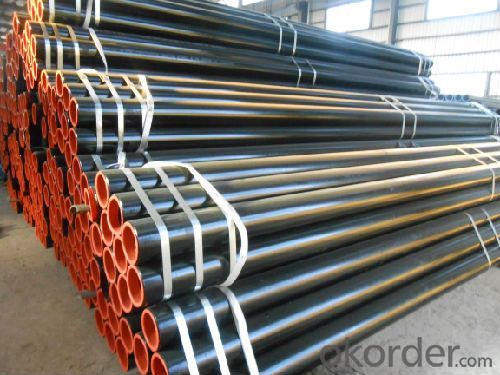
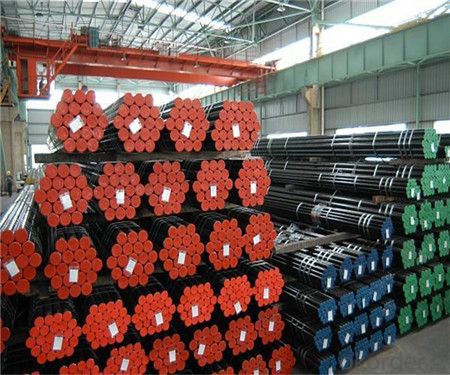
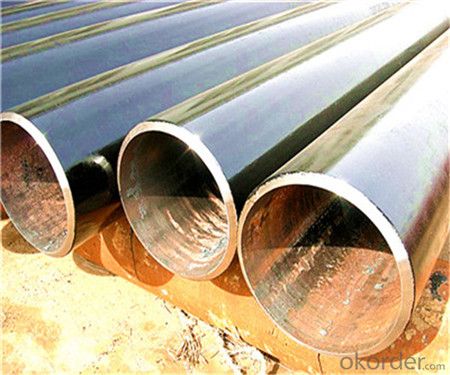
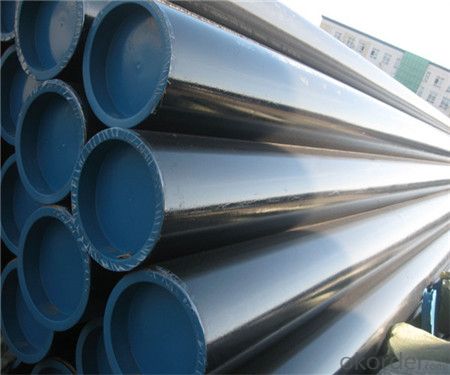
- Q: Can steel pipes be used for airport construction?
- Yes, steel pipes can be used for airport construction. Steel pipes are commonly used in various construction projects due to their durability, strength, and resistance to corrosion. They are capable of withstanding heavy loads and are often used for underground drainage systems, water supply networks, and structural support in airport construction.
- Q: How do you determine the required support spacing for steel pipes?
- The required support spacing for steel pipes is determined by considering various factors such as the pipe diameter, material strength, operating conditions, and local building codes and regulations. One of the primary considerations is the pipe's diameter. Larger diameter pipes generally require more frequent support than smaller diameter pipes to prevent excessive deflection and sagging. The material strength of the pipe is also important, as stronger pipes can span longer distances without additional support. The operating conditions of the pipe, such as the fluid being transported and the temperature, can also impact the required support spacing. For example, pipes carrying heavy or corrosive fluids may need more frequent support to prevent excessive stress and potential failure. Local building codes and regulations often provide specific guidelines for the minimum support spacing for steel pipes. These codes may take into account factors such as the pipe diameter, material strength, and operating conditions, as well as safety considerations and structural requirements. In general, it is essential to consult relevant codes, standards, and engineering guidelines to determine the required support spacing for steel pipes accurately. Additionally, working with qualified engineers and professionals experienced in pipe design and installation can ensure that the support spacing meets all necessary requirements and ensures the safe and efficient operation of the piping system.
- Q: Are steel pipes suitable for underground compressed air systems?
- Yes, steel pipes are generally suitable for underground compressed air systems. Steel pipes have several advantages that make them a popular choice for such applications. Firstly, steel pipes are known for their high strength and durability, which allows them to withstand the pressure and stress associated with compressed air systems. They can handle high operating pressures without any significant risk of bursting or leaking. Secondly, steel pipes have excellent resistance to corrosion and can withstand exposure to moisture, soil, and other underground elements. This makes them a reliable choice for underground installations, where pipes may be exposed to moisture and other potentially corrosive substances. Furthermore, steel pipes are relatively easy to install and maintain. They can be welded or threaded together, ensuring a secure and leak-free connection. Additionally, steel pipes can be easily inspected and repaired if necessary, allowing for cost-effective maintenance and repairs. However, it is important to note that the suitability of steel pipes for underground compressed air systems may also depend on other factors such as the specific requirements and conditions of the system. It is advisable to consult with a professional engineer or a qualified expert to ensure that steel pipes are the most appropriate choice for a specific application.
- Q: What is the maximum length of steel pipes available in the market?
- The maximum length of steel pipes available in the market can vary depending on various factors such as the type of steel, manufacturing capabilities, transportation limitations, and customer requirements. However, in general, steel pipes can be manufactured in lengths of up to 12 meters (40 feet) or even longer. It is important to note that longer lengths may be more challenging to handle and transport, and may require specialized equipment or techniques. Ultimately, the maximum length of steel pipes available in the market will be determined by the specific needs and capabilities of the industry and customers.
- Q: Can steel pipes be used in extreme weather conditions?
- Yes, steel pipes can be used in extreme weather conditions. Steel is known for its high strength and durability, making it suitable for a wide range of applications including construction, infrastructure, and transportation. Steel pipes are commonly used to transport fluids and gases in various industries, and they are designed to withstand harsh environmental conditions, including extreme temperatures, high pressures, and corrosive environments. In extreme weather conditions such as extreme heat, cold, or heavy rain, steel pipes can maintain their structural integrity and functionality. Additionally, steel pipes can be coated or insulated to provide additional protection against corrosion and to maintain desired temperatures. Overall, steel pipes are a reliable choice for use in extreme weather conditions due to their strength, durability, and resistance to various environmental factors.
- Q: Can steel pipes be used for conveying sewage sludge?
- Indeed, sewage sludge can be conveyed using steel pipes. Steel pipes possess several properties that render them suitable for this purpose. Firstly, their strength and durability enable them to endure the pressure and weight of sewage sludge without collapsing or fracturing. This is of utmost importance as sewage sludge can be quite heavy and may contain solids that could exert stress on the pipes. Secondly, steel pipes exhibit resistance to corrosion, which is crucial when conveying sewage sludge that frequently contains corrosive components. By utilizing corrosion-resistant steel pipes, one can ensure a prolonged lifespan and minimize the risk of leaks or damage. Moreover, steel pipes can be manufactured in various sizes and diameters, granting flexibility in the design of sewage systems to meet specific requirements. Nonetheless, it is vital to emphasize the necessity of proper maintenance and regular cleaning to prevent sludge buildup and maintain the pipes' efficiency.
- Q: What is the difference between steel pipes and concrete pipes?
- Steel pipes and concrete pipes differ in their composition, construction, and characteristics. Steel pipes are made from steel, whereas concrete pipes are made from a mixture of cement, sand, aggregate, and water. Steel pipes are known for their strength, durability, and resistance to corrosion, making them suitable for high-pressure applications and underground installations. Concrete pipes, on the other hand, are renowned for their affordability, ease of installation, and resistance to fire. They are commonly used in stormwater drainage systems and sewerage networks. Overall, the choice between steel pipes and concrete pipes depends on the specific requirements of the project, such as budget, load-bearing capacity, and environmental factors.
- Q: What are the different methods of threading steel pipes?
- There are several methods for threading steel pipes, including manual threading using a handheld pipe threader, mechanical threading using a powered threading machine, and hydraulic threading using a hydraulic pipe threader. Additionally, some steel pipes can also be threaded using a die head or a threading lathe.
- Q: What are the different types of steel pipe coatings for corrosion protection?
- There are several types of steel pipe coatings used for corrosion protection, including epoxy coatings, polyethylene coatings, zinc coatings, and coal tar coatings. Each coating offers different levels of protection and is chosen based on the specific application and environmental conditions.
- Q: What is the lifespan of a steel pipe?
- The lifespan of a steel pipe can vary depending on several factors such as the quality of the pipe, the environment it is exposed to, and how well it is maintained. However, on average, a properly installed and maintained steel pipe can last anywhere from 20 to 50 years.
Send your message to us
Hot Rolled Steel Pipe Manufacturer
- Loading Port:
- China Main Port
- Payment Terms:
- TT or LC
- Min Order Qty:
- 30 m.t.
- Supply Capability:
- 12000 m.t./month
OKorder Service Pledge
OKorder Financial Service
Similar products
Hot products
Hot Searches
Related keywords
